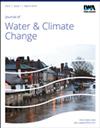Analysis of different hypotheses for modeling air–water exchange and temperature evolution in a tropical reservoir
IF 3.1
4区 环境科学与生态学
Q2 WATER RESOURCES
引用次数: 0
Abstract
This paper presents an analysis of air–water exchange in a Colombian tropical reservoir. A coupled thermal-3D hydrodynamic model using TELEMAC-3D and WAQTEL is implemented to evaluate the dynamics of thermal processes in the reservoir. A sensitivity analysis is carried out on various modeling parameters, such as turbulence models, temperature diffusion coefficients, and heat exchange at the free surface based on observations. In particular, three different approaches have been tested to study the impact of air–water exchanges at the free surface: a constant water temperature, constant meteorological forcing, and time-varying meteorological forcing. All the simulations correctly represent the constant heating at the free surface for the first meters. However, no simulation has been able to correctly reproduce the amplitude of temperature oscillations in the surface layers: only the simulations with time-varying meteorological forcing show temperature oscillations, but their amplitude is greatly overestimated. Eventually, the analysis shows that the most crucial parameters for a correct representation of the observed temperature behavior are the heat exchange coefficient and the wind. The different approaches tested all have limitations, but they can reproduce reservoir temperature trends at different depths with a maximum standard deviation ranging from 3 to 8 °C.热带水库水气交换和温度变化模型的不同假设分析
本文分析了哥伦比亚一个热带水库的水气交换情况。使用 TELEMAC-3D 和 WAQTEL 实现了热-三维水动力耦合模型,以评估水库中的热过程动态。根据观测结果,对湍流模型、温度扩散系数和自由表面热交换等各种建模参数进行了敏感性分析。特别是,测试了三种不同的方法来研究自由表面水气交换的影响:恒定水温、恒定气象强迫和时变气象强迫。所有模拟都正确地表示了自由表面第一米处的恒定加热。然而,没有一种模拟能够正确再现表层的温度振荡幅度:只有使用时变气象强迫的模拟显示了温度振荡,但其幅度被大大高估了。最后,分析表明,要正确反映观测到的温度行为,最关键的参数是热交换系数和风。所测试的不同方法都有局限性,但它们都能再现不同深度的水库温度趋势,最大标准偏差在 3 ℃ 至 8 ℃ 之间。
本文章由计算机程序翻译,如有差异,请以英文原文为准。
求助全文
约1分钟内获得全文
求助全文
来源期刊

Journal of Water and Climate Change
WATER RESOURCES-
CiteScore
4.80
自引率
10.70%
发文量
168
审稿时长
>12 weeks
期刊介绍:
Journal of Water and Climate Change publishes refereed research and practitioner papers on all aspects of water science, technology, management and innovation in response to climate change, with emphasis on reduction of energy usage.
 求助内容:
求助内容: 应助结果提醒方式:
应助结果提醒方式:


